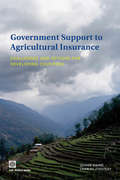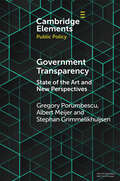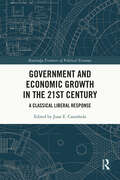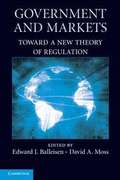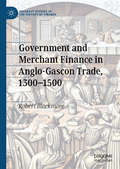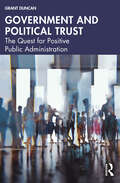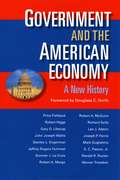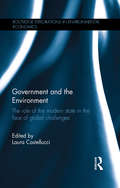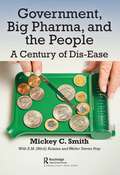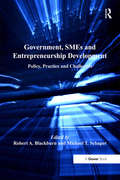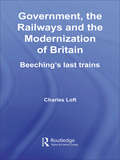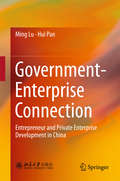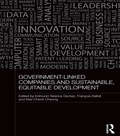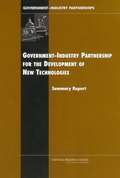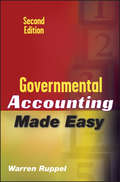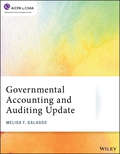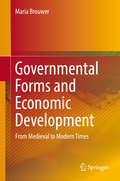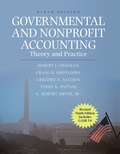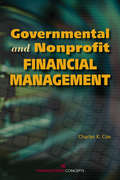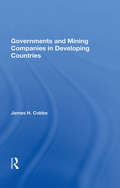- Table View
- List View
Government Spending on Health Care and Education in Croatia: Efficiency and Reform Options
by Etibar Jafarov Victoria GunnarssonA report from the International Monetary Fund.
Government Support to Agricultural Insurance
by Olivier Mahul Charles J. StutleyGovernments in developing countries have been increasingly involved in the support of agricultural (crop and livestock) insurance programs in recent years. In their attempts to design and implement agricultural insurance, they have sought technical and financial assistance from the international community and particularly from the World Bank. One of the recurrent requests from governments regards international experience with agricultural insurance, not only in developed countries, where in some cases agricultural insurance has been offered for more than a century, but also in middleand low-income countries. Governments are particularly interested in the technical, operational, financial, and institutional aspects of public support to agricultural insurance. 'Government Support to Agricultural Insurance' informs public and private decision makers involved in agricultural insurance about recent developments, with a particular focus on middle- and low-income countries. It presents an updated picture of the spectrum of institutional frameworks and experiences with agricultural insurance, ranging from countries in which the public sector provides no support to those in which governments heavily subsidize agricultural insurance. This analysis is based on a survey conducted by the World Bank's agricultural insurance team in 2008 in 65 developed and developing countries. Drawing on the survey results, the book identifies some key roles governments can play to support the development of sustainable, affordable, and cost-effective agricultural insurance programs.
Government Transparency: State of the Art and New Perspectives (Elements in Public Policy)
by Albert Meijer Gregory Porumbescu Stephan GrimmelikhuijsenThis Element argues that to understand why transparency “works” in one context, but fails in another, we have to take into account how institutional (macro), organizational (meso) contexts interact with individual behavior (micro). A review of research from each of these perspectives shows that the big promises thought to accompany greater transparency during the first two decades of the 20th century have not been delivered. For example, transparency does not necessarily lead to better government performance and more trust in government. At the same time, transparency is still a hallmark of democratic governance and as this book highlights, for instance, transparency has been relatively successful in combating government corruption. Finally, by explicitly taking a multilayered perspective into account, this Element develops new paths for future research.
Government Unions and the Bankrupting of America
by Daniel DisalvoGovernment-workers unions have been political juggernauts in the U.S. since the unseen collective-bargaining-rights revolution of the 1960s and '70s. These unions are different and more powerful than those that battle owners and managers in the private sector. To advance their interests, unions in the public sector have created cartels with their political allies, mostly in the Democratic Party, to the exclusion of the taxpaying public.In this Broadside, Daniel DiSalvo shows us how this government takeover happened and tells us what can be done to protect the public interest. The fiscal consequences have already proven dire and threaten the long-term power and prestige of the United States on the world stage.
Government and Economic Growth in the 21st Century: A Classical Liberal Response (Routledge Frontiers of Political Economy)
by Juan E. CastañedaThis book offers an alternative view of the economy – and indeed, society – that does not rely on an ever-expanding government to address the problems which individuals typically face during their lives.The book is a Classical Liberal response to the way leading economies have been (mis)managed in the last three decades and the principles and models that have guided such policies, particularly since the outbreak of the Global Financial Crisis in 2007–09, which has resulted in enlarged government deficits and public debt, as well as more intrusive government regulation and virtually no economic growth. The book does not only criticise the current dominant view which favours ever-growing governments but also puts forward an alternative set of policies and institutions compatible with long-term growth in a free(er) economy. The book is structured around three major themes: (1) what classical liberalism is (or should be) and why it still matters, (2) how state-sponsored capitalism hinders the well-functioning of the market economy as well as being a bad recipe for economic growth and individual freedom, and (3) which are the essential Classical Liberal institutions necessary for a free market economy to flourish.This volume will be accessible not only to specialists in the subject but also to a well-informed audience interested in current economic issues, the role of government in the economy, and how history, traditions, the political system, and economics shape the institutions that help us to explain how markets function and their outcomes.
Government and Economies in the Postwar World: Economic Policies and Comparative Performance, 1945-85
by Anthony Seldon Andrew GrahamThe chance to begin anew seldom occurs. Yet the nearly complete breakdown of the world economy between 1939 and 1945, together with the dominant position of the United States at the end of the war, provided just this opportunity. A new international economic order was built on the ruins of the old. How this happened - and the role of government in economic performance - is the subject of this important and timely book. Written by political scientists, contemporary historians and economists, it includes ten country studies covering all the major industrialized nations in the West: the USA, USSR, Japan, Germany, the United Kingdom, France, Italy, Spain, Eastern Europe, and Scandinavia. In each chapter readers will find information on the main objectives and instruments of economic policy, the institutional framework, where the country started from at the end of the war, and a summary of what happened thereafter both in terms of policies and outcomes. Each chapter also contains data on the country's economic performance, a list of selected dates of important events, and a guide to further reading. The book begins with an overview of the sytem of international trade and payments since the war, and ends with five commentaries drawing attention to contrasts and similarities between the nations. The commentaries feature David Henderson, Head of the Economics Division of the OECD, on the overall economic performance, Charles Feinstein on the influence of different starting points, David Marquand on the effect of different political and institutional structures, and Sidney Pollard on economic policies and traditions. Learning from other countries' experience as well as understanding how they see their own problems is increasingly important with 1992, glasnost', and the problem of international policy coordination between the USA, Japan, and Germany so high on the agenda. No other book provides such a wide-ranging account of how the industrialized world came to be where it is today.
Government and Markets: Toward a New Theory of Regulation
by Edward J. Balleisen David A. MossAfter two generations of emphasis on governmental inefficiency and the need for deregulation, we now see growing interest in the possibility of constructive governance, alongside public calls for new, smarter regulation. Yet there is a real danger that regulatory reforms will be rooted in outdated ideas. As the financial crisis has shown, neither traditional market failure models nor public choice theory, by themselves, sufficiently inform or explain our current regulatory challenges. Regulatory studies, long neglected in an atmosphere focused on deregulatory work, is in critical need of new models and theories that can guide effective policy-making. This interdisciplinary volume points the way toward the modernization of regulatory theory. Its essays by leading scholars move past predominant approaches, integrating the latest research about the interplay between human behavior, societal needs, and regulatory institutions. The book concludes by setting out a potential research agenda for the social sciences.
Government and Merchant Finance in Anglo-Gascon Trade, 1300–1500 (Palgrave Studies in the History of Finance)
by Robert BlackmoreThe Late Middle Ages (c.1300–c.1500) saw the development of many of the key economic institutions of the modern unitary nation-state in Europe. After the ‘commercial revolution’ of the thirteenth century, taxes on trade became increasingly significant contributors to government finances, and as such there were ever greater efforts to control the flow of goods and money.This book presents a case study of the commercial and financial links between the kingdom of England and the duchy of Aquitaine across the late-medieval period, with a special emphasis on the role of the English Plantagenet government that had ruled both in a political union since 1154. It establishes a strong connection between fluctuations in commodity markets, large monetary flows and unstable financial markets, most notably in trade credit and equity partnerships.It shows how the economic relationship deteriorated under the many exogenous shocks of the period, the wars, plagues and famines, as well as politically motivated regulatory intervention. Despite frequent efforts to innovate in response, both merchants and governments experienced a series of protracted financial crises that presaged the break-up of the union of kingdom and duchy in 1453, with the latter’s conquest by the French crown. Of particular interest to scholars of the late-medieval European economy, this book will also appeal to those researching wider economic or financial history.
Government and Not-for-Profit Organizations: Designing Successful IT Governance
by Jeanne W. Ross Peter WeillThis chapter explores the complex and unique IT governance challenges facing senior managers of government and not-for-profit organizations using case studies of the United Kingdom's Metropolitan Police Service-Scotland Yard and UNICEF. This chapter was originally published as chapter 7 of "IT Governance: How Top Performers Manage IT Decision Rights for Superior Results."
Government and Political Trust: The Quest for Positive Public Administration
by Grant DuncanIf the government is a problem, what should be done about it? A new era of intervention has begun following a global pandemic, climate change and strategic rivalry – but will a better government emerge from this? Political turmoil and polarisation are causing people to question how well their societies are governed and how leaders conduct themselves, while urgent practical challenges are arising for public policy and administration. A deeper concern, then, is to re-examine the nature and problem of government itself. This study covers historically enduring dilemmas that will persist, as well as emerging issues such as climate change and Artificial Intelligence. It sets out core concerns that systems of government, of all kinds, must address. The wide diversity of political beliefs and constitutions calls for toleration in order to foster effective collaboration across types and levels of government. Each country, community and individual follows their own path, but we can all do something to help restore political trust and to raise standards of public administration. An essential guide for those seeking general and lasting principles of good government, including elected officials, civil servants, community leaders and students of politics and public policy.
Government and the American Economy: A New History
by Price V. FishbackThe American economy has provided a level of well-being that has consistently ranked at or near the top of the international ladder. A key source of this success has been widespread participation in political and economic processes. In The Government and the American Economy, leading economic historians chronicle the significance of America’s open-access society and the roles played by government in its unrivaled success story. America’s democratic experiment, the authors show, allowed individuals and interest groups to shape the structure and policies of government, which, in turn, have fostered economic success and innovation by emphasizing private property rights, the rule of law, and protections of individual freedom. In response to new demands for infrastructure, America’s federal structure hastened development by promoting the primacy of states, cities, and national governments. More recently, the economic reach of American government expanded dramatically as the populace accepted stronger limits on its economic freedoms in exchange for the increased security provided by regulation, an expanded welfare state, and a stronger national defense.
Government and the Environment: The Role of the Modern State in the Face of Global Challenges (Routledge Explorations in Environmental Economics)
by Laura CastellucciIn the today’s global "commercial society" an inquiry into the economic role of government is gaining momentum. Many crucial goods for the wellbeing of a society are not "commercial", national security and clean air are great examples. This means that the economic role of government is not limited to cure the so called "market failures" but it has to provide for non-commercial goods. Unfortunately in the last few decades the decline of the political-economic culture of western post-industrial societies has left scope for people to blindly believe in a free, deregulated market. This book brings the culture of the state in from the cold, by confronting readers at the start with the necessity of recognizing the fundamental difference between private commercial interests, whose provision rests on the culture of profit, and public shared interests, whose provision rests on the culture of the state. This book also explores how much individual wellbeing does depend on both. The only chance for public shared interests, with their non-profit nature, to successfully keep their ground in the face of the overwhelming power of private commercial/financial interests, lies in regenerating a political-economic state culture whereby governments and policy makers/politicians understand their responsibility and social function to consist primarily in pursuing the satisfaction of the formers and not in acting on behalf of the latter.
Government versus Markets: A Contemporary and Historical Perspective
by Vito TanziVito Tanzi offers a truly comprehensive treatment of the economic role of the state in the twentieth and twenty-first centuries from a historical and world perspective. The book addresses the fundamental question of what governments should do, or have attempted to do, in economic activities in past and recent periods. It also speculates on what they are likely or may be forced to do in future years. The investigation assembles a large set of statistical information that should prove useful to policy-makers and scholars in the perennial discussion of government's optimal economic roles. It will become an essential reference work on the analytical borders between the market and the state, and on what a reasonable 'exit strategy' from the current fiscal crises should be.
Government, Big Pharma, and The People: A Century of Dis-Ease
by Mickey C. SmithPharmaceuticals constitute a relatively small share of the total Health Care expenditure in most developed economies, and yet they play a critical role in the ongoing debate over how best to advance, improve, and afford Health Care. Despite this, and perhaps because of this, the industry has had, for many years, an outsized claim to fame and controversy, praise and criticisms, and support and condemnation. Unfortunately, many participants in the debate do not fully understand the complexities of the industry and its role in the overall Health Care system. The analytical tools of economics provide a strong foundation for a better understanding of the dynamics of the pharmaceutical industry, its contribution to Health and Health Care, and its dual and often conflicting priorities of affordability and innovation, as well as the various Private and Public Policy initiatives directed at the sector. Everyone is affected by Big Pharma and the products they produce. At the Drug store, the physician’s office, in front of the television, in everyday conversations, Drugs are a part of our lives. Society shapes our values toward Drugs and Drugs shape society. ("The Pill" and minor tranquilizers are good examples.) And, of course, the way Congress deliberates and Big Pharma responds has a huge impact on how Drugs affect our lives. This book is well-researched on the subject of the pharmaceutical industry, its struggles with Government, and its relationship to the consumer from the early twentieth century until the present. The Dynamic Tension between the three participants – Government, Big Pharma, and the People – is described and explained to lead to an understanding of the controversies that rage today. The author describes how the Government, its many investigatory efforts, and the ultimate legislative results affect the industry and the consequences of their activities are explored in light of their effects on other players, including the patients and consumers who rely on both Government and Big Pharma for their well-being and who find sometimes unexpected consequences while giving special attention to the attitudes, beliefs, and misadventures of less-than-optimal Drug use. Stakeholders are identified with physicians as a major focus, as well as describing the significance of prescriptions as social objects and the processes by which physicians make choices on behalf of their patients. The author ties it all together with how Big Pharma affects and is affected by each of these groups. The author utilizes his 50-plus years’ experience as an academic, practicing pharmacist, and Big Pharma employee to describe the scope of the pharmaceutical industry and how it affects us on a daily basis, concluding with an inside look at Big Pharma and how regulations, marketing, and the press have affected their business, both good and bad.
Government, SMEs and Entrepreneurship Development: Policy, Practice and Challenges
by Robert A. BlackburnRecent decades have seen substantial growth in the range of assistance programmes for SMEs and entrepreneurs across the world. Once regarded as peripheral to the economy and public policy, the role of small firms and of entrepreneurship is now recognized as of key importance in the economic growth and development strategies of many nations. The range of interventions and support focused on promoting SMEs and entrepreneurship is substantial and expanding, so Government, SMEs and Entrepreneurship Development asks ’what are some of the main policy instruments being used, and how effective are they?’ It considers policies in different countries, examines key interventions and tools used to promote entrepreneurship and SME development and concludes with contributions on how to best evaluate their effectiveness. The contributor chapters by academics and practitioners from businesses, enterprise development agencies and governments, are empirical or evidence-based and use both quantitative and qualitative approaches. Drawing on experience from a wide range of both developed and emerging countries and economies, the contributions focus on the broad strategies that different governments and communities have adopted to foster entrepreneurship and SMEs; the policy tools and instruments that can be used to promote small business and entrepreneurship; and on the outcomes of policy instruments and the methods used to evaluate interventions. Their findings will help researchers, policy-makers, economic development officers, civil servants, elected officials, and business associations to better understand the issues in this important field.
Government, the Railways and the Modernization of Britain: Beeching's Last Trains (British Politics and Society)
by Charles LoftMore than 40 years after its publication, the 1963 Beeching Report on British railways remains controversial for recommending the closure of a third of Britain’s railways. In this book, Charles Loft examines: why the nationalized railways were in such dire financial straits by 1963 how government work on future transport needs led to conclusions which would have cut Britain’s railways down by thousands of miles what difficulties eventually halted attempts by Conservative and Labour governments to implement these cuts. This book will be invaluable to anyone interested in how transport policy is made or how it has arrived at its current state and sheds fascinating new light on the working of government, the economy and the mood of the times under Churchill, Eden, Macmillan and Wilson.
Government-Enterprise Connection
by Ming Lu Hui PanThis book is an empirical study on the relationship between private enterprises, entrepreneurs and the government in P. R. China. The two authors conducted a detailed survey of enterprises and entrepreneurs in Liuzhou, Guangxi Zhuang Autonomous Region, China. Although it was only conducted in a medium sized city, the survey provides a rare source of information on matched entrepreneur-enterprise pairs. It provides detailed information on management, performance, enterprise-government relationship, as well as entrepreneurs' personal information and measurements of various psychological parameters. With this first-hand information, the authors analyzed several interesting issues concerning enterprise-entrepreneur-government relationships. Readers will gain an understanding of the following topics: Why and how does China have such special enterprise-entrepreneur-government relationships? Do enterprises' political connections in the form of entrepreneurs' political status help improve the performances of these enterprises? Which of the surveyed entrepreneurs could become members of the People's Congress and the People's Political Consulting Conference? How do entrepreneurs feel when they are faced with greater government intervention? How will China move ahead in the ongoing reform and development in the light of the enterprise-entrepreneur-government relationship? This book examines the way in which China's enterprise-entrepreneur-government relationship helps enterprises develop in a transitional market. In the appendix to this book, one of the authors, Ming Lu, provides evidence, based on data from listed companies, that having political connections can help enterprises enter the markets of provinces other than their place of registration. However, this political connection also distorts the market by giving the entrepreneurs more opportunities to develop their business. At the same time, those entrepren eurs who face interventions from the government also shoulder greater costs in the form of loss of psychological happiness. The inference of this book is that at some point in the foreseeable future, China will gradually build its market system and integrate its domestic markets, so that private enterprises will no longer rely so heavily on their political connections.
Government-Linked Companies and Sustainable, Equitable Development (Routledge Malaysian Studies Series)
by François Bafoil Terence Gomez Kee-Cheok CheongThe debate over how far governments should intervene in economies in order to promote economic growth, a debate which from the 1980s seemed settled in favour of the neo-liberal, non-interventionist consensus, has taken on new vigour since the financial crisis of 2008 and after. Some countries, most of them in industrialised Asia, have survived the crisis, and secured equitable economic growth, by adopting a developmental state model, whereby governments have intervened in their economies, often through explicit support for individual companies. This book explores debates about government intervention, assesses interventionist policies, including industrial and innovation policies, and examines in particular the key institutions which play a crucial role in implementing government policies and in building the bridge between the state and the private sector. The countries covered include China, India, South Korea, Malaysia and Taiwan, together with representative countries from Europe and Latin America.
Government-industry Partnerships For The Development Of New Technologies
by Technology Board On Science Economic PolicyThis report reviews a variety of partnership programs in the United States, and finds that partnerships constitute a vital positive element of public policy, helping to address major challenges and opportunities at the nexus of science, technology, and economic growth.
Governmental Accounting Made Easy
by Warren RuppelA hands-on guide to the ins and outs of governmental accounting--made easy!Governmental Accounting Made Easy, Second Edition equips you with the tools you need to run the financial and accounting operations within your organization. This complete and straightforward manual covers a broad range of governmental accounting topics that fall under the Governmental Accounting Standards Board, and its recently revised financial reporting model.Boiling down the complicated details of governmental accounting into manageable essentials, author Warren Ruppel, a leading authority on governmental accounting, offers practical information in easy-to-understand terminology. Even if you do not have a professional understanding of accounting principles and financial reporting, the Second Edition makes it all clear with accounting rules explained in terms anyone can understand, to help you better fulfill your managerial and fiduciary duties.Always practical and never over-technical, this helpful guide:Discusses basic accounting terminologyClearly explains fund accountingCovers the nuts and bolts of governmental financial statementsEquips you to understand the reporting entityDiscusses revenues from non-exchange transactionsHelps you become conversant in various accounting topicsThe recently adopted reporting model for governments resulted in a radical change in the way governmental financial statements are presented. Suitable for professional managers, budget preparers, school boards, city councils, state legislators, and comptrollers, Governmental Accounting Made Easy, Second Edition is your essential guide for a clear, concise, understandable explanation of government finances.
Governmental Accounting and Auditing Update (AICPA)
by Melisa F. GalassoBe prepared for change by ensuring that you are current in accounting and auditing developments affecting government. Learn the latest accounting and auditing developments affecting governments by covering these hot topics: Risk assessment Documentation Leases Yellow Book Major program determination New GASB pronouncements
Governmental Forms and Economic Development
by Maria BrouwerThis book investigates the performance of economic development under different forms of government, ranging from autocratic states to liberal democracies. Starting with a critical review of the literature on social and economic development, including the works of Frank Knight, Max Weber, Joseph Schumpeter and Peter Drucker, it offers a historical analysis of the expansion of markets, cities and trade in medieval Europe, and the monopolization of trade by the emerging European nation states. The book also presents a case study on the rise and decline of the Dutch Republic, discusses topics such as the disadvantages of the central direction of economic organizations, and federal decentralization as a model for promoting growth and investment, and illustrates how successful companies like Semco and Google are building on centuries-old management principles.
Governmental and Nonprofit Accounting: Theory and Practice
by Robert J. Freeman Craig D. Shoulders Gregory S. Allison G. Robert Smith Terry K. PattonThis comprehensive textbook is written through the eyes of the learner to prepare them for professional government and not-for-profit accounting practice and the CPA exam. The updated ninth edition now includes information on new GASB Statement 54,Fund Balance Reporting and Governmental Fund Type Definitions.
Governmental and Nonprofit Financial Management
by Charles K. Coe PhDThe first book to comprehensively discuss both governmental and nonprofit financial management!Governmental and Nonprofit Financial Management makes it easy for both nonprofit and governmental managers to understand essential governmental and nonprofit financial management topics and their various subfields.• Understand the similarities and differences between governmental and nonprofit financial management standards and procedures• Learn multiple cost-saving techniques• Explore highly technical financial management subfields, from auditing and financial analysis to capital budgeting and risk management• Use over 40 applications to calculate everything from T-bill yield to lost cash discounts• Benefit from the in-depth coverage — an excellent primer for the non-accountantBonus! Apply what you have learned by completing problems, cases, and report writing exercises at the end of each chapter.
Governments And Mining Companies In Developing Countries
by James H. CobbeThis book examines the relationship between the governments of less developed countries (LDCs) and foreign-owned firms engaged in the extraction of minerals for export. With an approach that synthesizes economic theory, technical considerations, and political factors, Cobbe provides a fresh look at the policy aspects of the "resource bargaining pro

